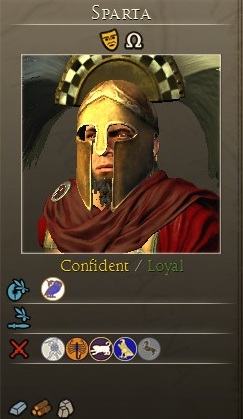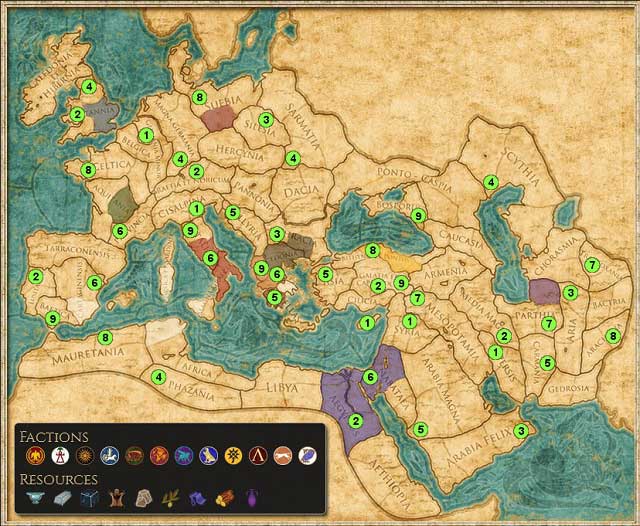Diplomacy | Politics TW: Rome II Guide
Last update: 11 May 2016
Interface
Diplomacy panel (9 key) allows you to establish diplomatic relations with encountered factions. After selecting any country, you'll see on the map its provinces and its current allies and enemies.

An information panel on the right will give you some more information: current diplomatic relations with the faction, aggressiveness and reliability and more accurate list of enemies and allies. You'll also find there a list of goods which a given country can export thanks to the commercial treaty.

Diplomatic talks
After pressing an appropriate button you'll start negotiations. You can add here further offers or demands and depending on the balance of power and current relations with the given faction, you can achieve consensus or your proposal will be immediately rejected.

List of proposals looks like this:
Payments & State Gifts - gifts improve diplomatic relations between factions and make your offer more favorable. It is good to use this option from time to time, so that the target faction will have more respect for you, which will make future negotiations easier.
Military access - it allows your troops to enter another faction's territory without any repercussions. This option is useful when you want to attack distant enemy.
Non-aggression pact - it improves relations between factions. This is the first step for future alliances.
Defensive alliance - it guarantees support from a faction when you gets attacked.
Military alliance - it allows you to attack another faction together with your ally. After declaring the war you can ask your ally to join the war.
Declaration of war - as the name suggests it starts the war between factions.
Satrapies & Client States - a faction which becomes a protectorate pays a tribute every turn and is connected with you by a defensive alliance. If the treasure is empty, you won't get any money. Protectorates are a good way to conquer the land without the need to monitor its expansion.
Form confederation - this option is available for barbarian tribes. You can join your forces with another tribe with common past - its land and army will become yours. This option is often available only in case of tribe which is much weaker than yours.
Trade agreement - it starts trading with given faction. Profits depend mainly on raw materials you have - if you do not have enough marble for example to build V level temple, trade agreement with appropriate country will allow you to import this material. In order to start trade with another faction, there must be a connection to it by land or sea. Due to lack of such a path, some countries are not able to establish trade relations in early turns of the game. A perfect example here is Sparta.

In order to ensure greater effectiveness of your diplomatic activities, you should closely monitor all factions. By attacking enemies from one group, you gain friends in another. Equally effective are various types of pacts and alliances. You should also pay attention to your ally loyalty and his aggression. Military alliance with barbarians will very quickly lead to the war with other factions.

Choosing allies
When choosing allies, you should first pay attention to their loyalty. The higher it is, the bigger the chance that given faction will act honorably and won't stab you on your back. For this reason I do not recommend negotiating with uncertain neighbors - you can be sure that they will break previous pacts or attack you when you least expect it. In case of loyal factions you can regularly send them gifts in order to slowly win over them.
But you should remember that regardless of relations between factions, the most important is the one, who is the strongest. The stronger your army is, the greater impact you have on your neighbors - you can even convince your fiercest enemies to sign a trade agreement or make them into protectorate. In extreme cases it is you who can be a protectorate - you'll have to pay tribute regularly but your country will be able to develop to sooner or later return to the international arena. In such case there is Athens, being a protectorate for Macedonia from the beginning of the game.
Protectorates and confederation
It is not always easy to convince another faction to join up with your empire. Not only should you make sure that diplomatic relations with that nations are on a sufficiently high level: a prosperous neighbor will usually see no reasons to become your protégé. Most often, factions that are at the brink of extinction that ask for your help - their armies are weak, they have one region and they are besieged by the enemy. Not only do protectorates pay tribute, but they also allow you to recruit in the area, which diversifies the units available to you and replenish your losses.
Convincing a given tribe to join your confederacy is similar, but you can sometimes speed this process up. Declaring a war to a former ally, destroying his armies and besieging his cities will often be a sufficient stimulus for the faction to join up. Although both conquest and the forced confederacy requires of you that you destroy the army of your neighbor, the latter provides you with an advantage: you will not have to worry about the increase with dissatisfaction in the newly-conquered province. This will allow you to take advantage of the productivity of that region to its fullest, and often, you will also recaive a few experienced generals.
Strategic resources map
Both during the trade and conquest you'll need to gather sufficient strategic resources which are required to build your most powerful constructions. The map below shows the deployment of all resources available in the game.

Legend:
- 1 - glassware
- 2 - iron
- 3 - lead
- 4 - leather
- 5 - marble
- 6 - olive oil
- 7 - silk
- 8 - timber
- 9 - wine
